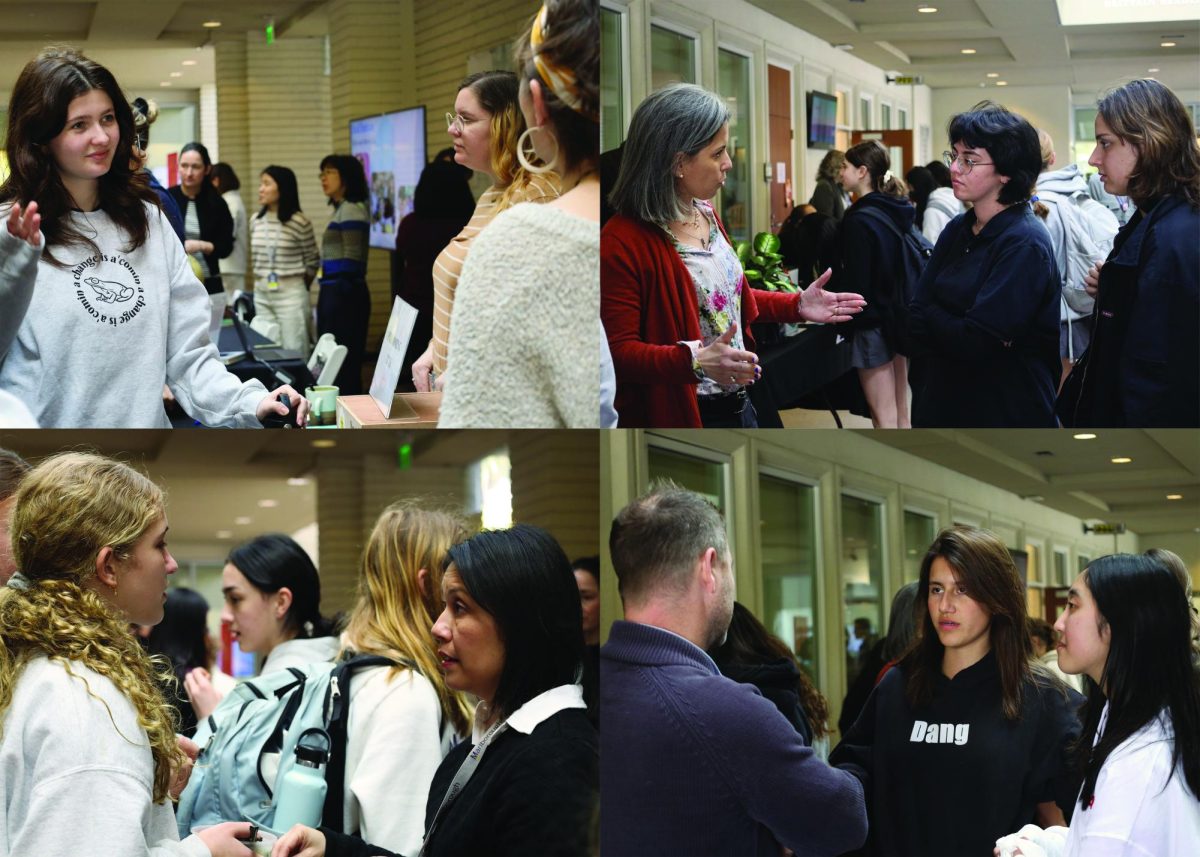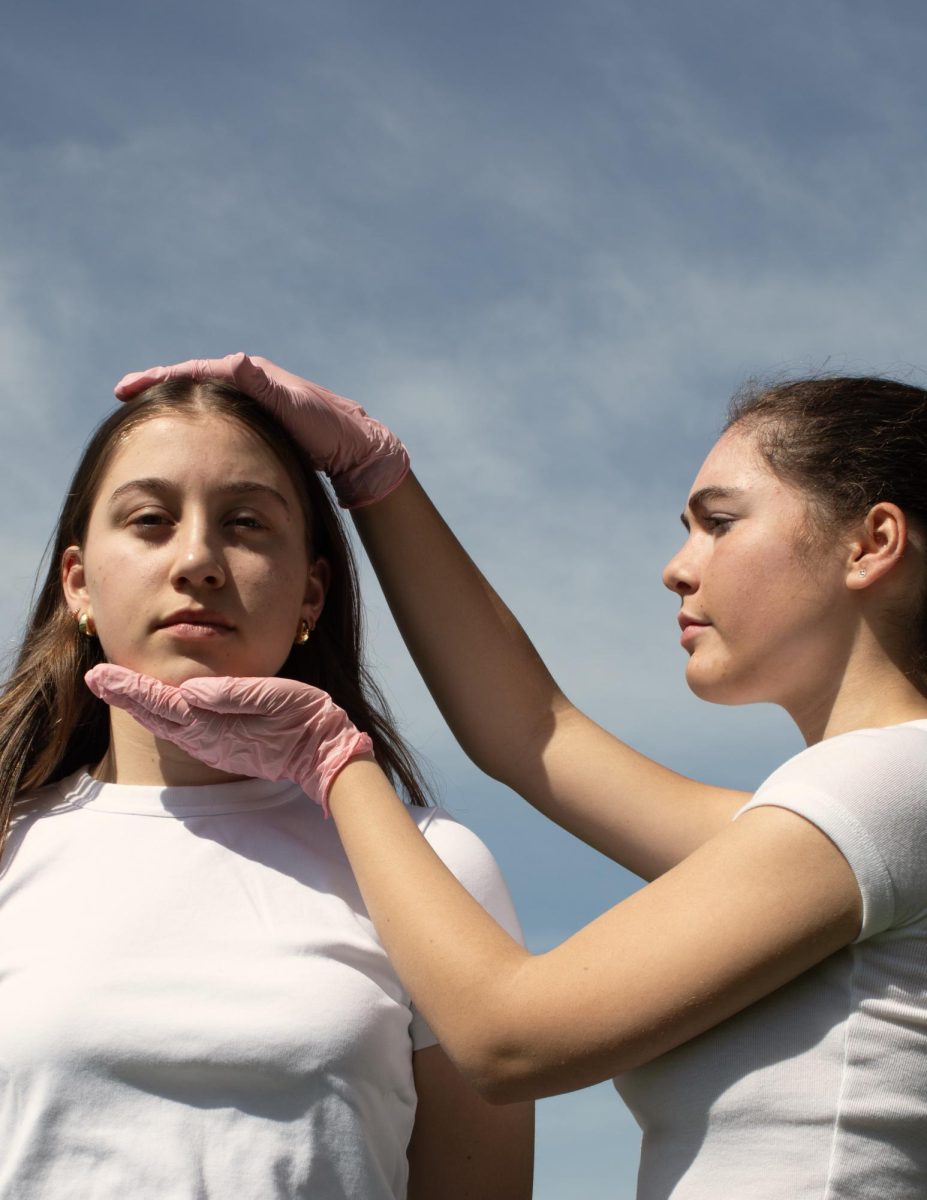by Sarah ’17, Car ’17, Bridget ’18, Sora ’18 and Clara ’18
Marlborough girls know this scene well: the student body rushes out of an All-School Meeting amid the sounds of seniors worrying about college, juniors worrying about APs, sophomores worrying about becoming juniors, and so on down to seventh graders worrying about their math test.
Academic, social and extracurricular pressures, as well as the unattainable pursuit of perfection can be detrimental to emotional health. Emotional health is assessed by the degree to which a person feels secure and relaxed in everyday life. On a daily basis, Marlborough girls juggle family pressures, academic endeavors, and after school commitments. They cope with these stressors in a variety of ways. Sometimes the lack of control over school or social pressures can lead to anxiety, eating disorders or depression.
The National Alliance for the Mentally Ill reports that 20 percent of young people in the age range of 13-18 are affected by a mental illness.
The negative stigma surrounding emotional health often prevents those affected from seeking help. Actress Kristen Bell opened up about her own mental illness in an interview with Sam Jones for his YouTube show, “Off the Camera.” According to Bell, women are twice as likely to be diagnosed with an anxiety disorder than men.
“I went on a prescription when I was really young and it helped with my anxiety and depression and I still take it to this day. I have no shame…and the world wants to shame you,” Bell said.
Bell concluded with her hope for the future of removing the mental health stigma.
GIRLS IN AMERICA
According to a 2008 report published by the National Adolescent Health Information Center (NAHIC), one in five Americans ages 12 to 17 has a diagnosable mental health disorder. This same report shows that females in that age range are about twice as likely to suffer from depression or to attempt suicide than their male counterparts. It also showed that adolescent females were more likely to suffer from eating disorders, substance abuse problems, and learning disabilities. Among teenagers, rates of depression and anxiety have increased by 70 percent over the last 25 years.
“I went on a perscription when I was really young and it helped with my anxiety and depression and I still take it to this day. I have no shame.”
—Kristen Bell
Mental Health America reports that girls ages 14-18 have consistently higher rates of depression than boys in the same age group. Additionally, there is a very strong relationship between eating disorders and depression in women and girls.
There are many contributing factors to one’s mental or emotional health, but, according to Beth Kawaja, a therapist who works mostly with adolescents, some of the most common problems for the teenagers she works with are rooted in day-to-day stresses which comprise a combination of academic, athletic and home pressures.
“I see academic pressure that hasn’t turned into full anxiety or depression….There’s really all kinds of things that I see, but I’d say anxiety, depression, and body image issues would be towards the top of the list,” Kawaja said of the teenage girls she works with.
Dominique ’17 is aware of her peers at Marlborough struggling with similar pressures.
“I’ve heard about people who [do not] have great relationships with their families, and that’s a big source of stress for them. People who have more pressure put on them by their parents than they do by the institution,” she said.
Meanwhile, Sarah Baker-Wacks ’16 who started the Dear Sally peer support program that will start next year, voiced her concern surrounding body image issues of Marlborough girls.

“I know that eating disorders are an issue at Marlborough. I have had many people talk to me regarding eating disorders, and I have heard things about the number of eating disorders at Marlborough that have has really concerned me,” Baker-Wackes said, adding that these problems may be caused by the desire to be the “perfect Marlborough girl.”
Nicole Brooks ’86, an alum who has dealt with some of these issues, commented on the problems associated with seeing others’ lives as ‘perfect.’
“Low self esteem is very common among adolescent girls, particularly with the rise of social media and having access to all these perfect pictures of our friends. The bigger problems come when we start to compare our insides to their outsides,” she said.
Emily ’18, who is passionate about raising awareness on emotional health, and will be collaborating withthe new Director of Educational and Counseling Services Marisa Crandal, on a new emotional health peer support group. Bragin believes that Marlborough’s competitive nature plays into students’ abilities to deal with these pressures.
“At Marlborough, people like to compare their stress and like to say ‘I have OCD’ or ‘I’m so OCD’ and OCD isn’t an adjective, and many times it’s not necessarily true. Instead of comparing our stress or comparing how little sleep we get, just supporting each other and making the comparison be more positive rather than negative,” Bragin said.
Dominique agreed with Emily.
“We’re all very competitive people…so a lot of Marlborough culture is basic competition because everybody feels the need to be the best—or the best at being the worst, I guess. No matter what area it is, we get like that about having friends, about academics, about social media and then of course about the glamorised deterioration of your mental health,” Dominique said.
MENTAL HEALTH AT MARLBOROUGH
Beginning in the 2016-2017 school year, Crandall will work with School Counselor Emily Vaughn to see students struggling with both emotional and learning issues ranging from anxiety to eating disorders to learning disabilities, as well as putting together programs for both students and parents to help with different aspects of students’ emotional well-being.

“A lot of Marlborough culture is basic competition…and of course the glamorised deterioration of your mental health.”
—Dominique ’16
According to Assistant Head of School and Head of Upper School Laura Hotchkiss ’86, Crandall will work primarily with the Upper School, and Vaughn will work primarily with the Middle School. Vaughn and Crandall will head up different initiatives to help each age range of the student body. Crandall will oversee all new programs and collaborate with Vaughn in all student cases.
Sands explained the main goal for the establishment of the Educational and Counseling Services Department.
“I think the end goal is to have more opportunities for students to have outlets to talk about whatever issue is going on,” Sands said. “We do a lot for physical health and for academics, but I need to be sure that everyone is mentally healthy.”
Apart from this new outlet provided by the school, there are alternatives for students to be supported by peers as well.
This past year Sarah ’16 has been involved in implementing a peer support program at Marlborough along with Sarah ’16 and Sabrina ’16. Sarah, Sarah and Sabrina all volunteer at Teen Line, a non-profit organization that provides a confidential helpline for teenagers; all calls, texts, emails and messages are answered by Southern California teens who are specially trained to listen to callers about issues ranging from abuse to depression to AIDS to pregnancy.
According to Sarah, the program they are creating at Marlborough will mostly be online using email and Google Chat, an instant-messaging service through Google.
Sarah said she hopes that girls in older grades can give advice to younger students and help reduce their stress regarding issues, such as making friends or talking to teachers.
“I think that older students will be much more approachable through the peer support system because they will have gone through similar experiences and can share their advice,” Sarah said.
Sarah commented on the need for students to have outlets to seek help.
“I think we saw that it is hard for Marlborough girls to seek help for themselves publicly, so I think that the anonymity of the peer counseling system will make it easier for girls to seek help,” Sarah said.
One of the ways that girls can seek help on campus is through meditation. History and social sciences instructor Michael Rindge practices meditation and mindfulness and has led mindfulness retreats for students. Rindge said he hopes such retreats can help students cultivate techniques to become more present and mindful in everyday life.
“I think this school could do a better job of thinking through the trajectory of 7th-12th grade and the ways that we can educate the girls through self-care and self-management and provide comfort and confidence on a whole host of issues that do touch on well-being in general, but also they can touch on mental health,” Rindge said.
Rindge offered a multitude of resources for students to access including the Meditation Club, which meets every Tuesday in the Upper Dance studio, the Caswell Scholars class that Rindge is involved in, the quiet meditation room next to Vaughn’s office, yoga classes offered by yoga instructor Christine Burke, as well as the online resources that are easily available to students, such as the apps Omvana or Headspace.
REMOVING THE STIGMA
People are comfortable seeking help if they have a broken arm or another physical ailment, but many people are reluctant to ask for help with mental health issues. Though Marlborough is seeking to assist girls dealing with emotional and mental health issues, the stigma surrounding this prevents them from seeking help. According to the UltraViolet survey, of the 174 responses, 61.5% of Marlborough girls have felt the need to talk to an adult about a mental health issue. Mental health stigmas can be divided into two distinct types. The American Psychological Association reports that people either self stigmatize or society imposes it upon them. Adolescents, especially teen girls, are afraid to seek help or therapy for emotional and mental health issues. Social pressures and expectations have impeded their ability to better their emotional health because many girls are embarrassed or ashamed. Defeating the stigma associated with mental health, which is often perpetuated by a lack of knowledge and information, is vital in shifting the feeling of shame to one of support.
“I think…the peer support system will make it easier for girls to seek help.”
—Sarah ’16
Kawaja explains how people treat mental and physical health differently.
“I think we have associated seeking any kind of help for emotional issues or relationship challenges as being in some way a weakness, and it really has never made any sense to me because we don’t judge people negatively for seeking guidance with anything else with which they may need help with,” Kawaja said.
Kawaja said she hopes that removing the stigma around emotional well-being will encourage people to seek the help they need.
In order to eliminate the stigma, yoga instructor Christine Burke also stressed the importance of establishing an environment that embraces communication.
“I think [students] may feel self conscious if they are seen going to talk to a counselor or going to therapy. Creating an environment with more discussion will help to make it less of a stigma or something they feel they need to hide. They would realize they are not so alone or different,” Burke said.
In order to foster an environment of acceptance around mental health, Caelan ’18 is working with Emily to form a peer support group. Caelan is optimistic about eliminating the stigma.
“We’re hoping to raise awareness and lift stigma around mental health especially at a place like Marlborough where the pressure and stress is always high. We’re trying to start the conversation and give girls a safe space to talk about as little or as much as they want,” Caelan said.
As the new director, Crandall will be to address the concerns surrounding emotional health and help raise awareness in order to create an understanding of emotional and physical well being.
“I think education around mental health and prevention, as well as instruction in functional coping skills are important tools in creating a culture that has a healthy understanding of mental and physical health,” Crandall said in an email.












